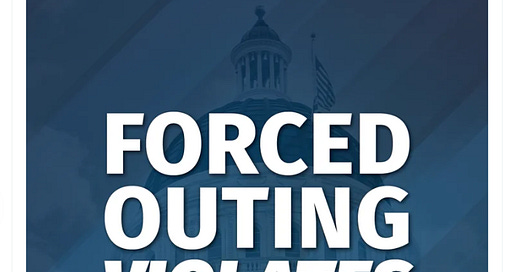No One is Being "Outed" When Districts Decline to Deceive Parents About Their Children
Our Public Schoolteacher Correspondent on a Manipulative Rhetorical Ploy
Today’s guest post marks the return of Moonlit Piglet, our pseudonymous schoolteacher correspondent who has written about the way gender ideology and the ongoing racial meltdown are playing out in the daily lives of students, teachers, and administrators at a large public school in a Blue city in a Blue state. He writes about a topic that I will be writing about often in the weeks and months to come: active deception by teachers and administrators to keep parents in the dark about changes in names and pronouns requested by gender confused children without parental notice or consent. There is a lot of news to follow on this front and many disturbing implications to tease out about the fact that this aberrant practice that assaults parental rights has come to be accepted in thousands of school districts across the country on the basis of paranoid and delusional reasoning in the midst of a social contagion. I was pleased to ratio CA State Senator Scott Wiener on this with the basic contours of my argument yesterday, but much more remains to be said about the crisis of public authority that California is setting in motion by attempting to deny the right of local districts to set their own policies on this matter.
Today’s post is a succinct exercise in reason and persuasion that scrutinizes a key part of the rhetorical messaging strategy adopted by supporters of the practice of the sort that it never occurs to me to write but that I am glad to be able to publish. — Wesley Yang
By Moonlit Piglet
What does it mean to “out” someone?
For most us, we picture tabloids going after closeted pop stars or reporters breaking news about a politician’s affair — in other words, someone deliberately and intentionally revealing some aspect of another person’s private life to humiliate or expose them. And if that’s what comes to mind for you, you’re likely to be concerned when you hear California’s attorney general accuse local school districts of attempting to “forcibly out” transgender students.
As a teacher myself, I’ll admit I was disturbed when I first heard these claims. But when I went to read the actual guidance, I couldn’t find this “forcible outing” anywhere. Nowhere do these schools require or even recommend that teachers take initiative to proactively reveal a child’s gender identity to their parents. Rather, the guidance simply requires parental approval before teachers and staff can begin facilitating a child’s transition with a new name or new pronouns. In other words, if I were to overhear that a student of mine identified as transgender, these policies wouldn’t require that I sound the alarm that very instant — they would simply prevent me from deciding, with zero outside input, to immediately affirm them behind their parents’ backs.
Unfortunately, this sort of bait-and-switch is nothing new. For years now, transgender activists have dishonestly conflated two distinct questions under the broad umbrella of “outing.” The first is whether teachers and staff should be required to immediately, proactively inform parents about a child’s transgender identity; the second is whether teachers and staff should be required to immediately, proactively deceivethem about the same. The former could properly be called “outing,” and as a teacher, I have legitimate concerns with any policy that would put me in the position of evaluating, much less reporting, a student’s gender non-conformity. With that said, when and where it becomes necessary for schools to break a student’s trust is always a complex issue, and decent people can disagree in good faith about exactly where that line should be.
When it comes to the latter question, however, the answer could not be simpler: Teachers and staff should obviously not engage in prolonged deception regarding our own practices. What names teachers are using, what records administrators are altering, what facilities coaches are directing their students to use — these are questions about the public-facing function of a state institution, not the private identity of an individual child. If anyone is being “outed” by policies that require parents be informed of these things, it’s not the student. It’s the school.
To refer to the policies transgender activists advocate for as prolonged deception might strike some people as inflammatory. But in the context of the American school system, any other framing is dishonest. Remember that the median classroom in this country will have 25 students, and each student will be taking somewhere between six and eight regular classes — that means, all told, any one child is likely to learn alongside at least 150 others, every single day. If that child’s teachers are referring to them with a new name and set of pronouns, then that will be heard by enough kids to fully pack a good-sized movie theater. And that’s before you even consider the dozens of other teachers, principals, counselors, coaches, nurses, librarians, tutors, and secretaries a transitioning child is also likely to engage with. At some point, when it’s easier to list who doesn’t know than list who does, you have no business invoking the concept of privacy.
Moreover, many school districts — including my own — move beyond mere omission and act in ways that are unambiguously dishonest. It’s common practice in affirming districts, for example, to have distinct spaces for pronouns and “at home pronouns” on a child’s record, so teachers know to not reveal how they actually speak in the classroom when communicating with parents. The same is true for names, and even for sex markers in their demographic file. Transgender activists aren’t shy about their support for these accommodations, but I ask you: If all year long my gradebook says Lucas, and my assignments say Lucas, and my attendance says Lucas, but my emails home say Lauren, what other phrase applies to that beyond “prolonged deception?”
Ultimately, this is the issue: Not whether LGBT students should be “outed” by their teachers, but whether school administrators have the right to publicly facilitate a child’s transition while actively working behind the scenes to make sure parents don’t find out about what the school itself is doing. When seen in that light, the vast majority of reasonable people would answer with a resounding no — which is why, of course, transgender activists rely on misleading references to “outing” in the first place.
This is not to say that schools should never avoid calling home. Tragically, there are indeed children whowould be put in real danger if their families found out they identified as transgender. But far from defending these children, policies based around secrecy abandon them. Students living in truly unsafe homes deserve immediate, direct interventions — simply hiding things from abusive parents to avoid “setting them off” is a woefully inadequate approach. If a student of mine told me they were worried a bad test score might trigger a beating, I would certainly do more than just tweak the grade on their report card and then move on. Yet this is, essentially, the approach these notification policies take: Assume that parents are legitimately dangerous, but do nothing to address it beyond keeping quiet. That’s absurd.
Of course, most students who want their parents kept out of the loop aren’t even suggesting any real fears of abuse or abandonment anyway. They simply don’t feel ready to reveal that side of themselves to their families — and as educators, we ought to respect that. But that understandable hesitation on the part of a student doesn’t give us the right, as educators, to barge ahead on our own. As difficult as it may be, we have a responsibility to help students overcome that reluctance, rather than uncritically validating it. When it comes to any other issue — applying for special education services, for example, or participating in school sports — this would be the default approach. Why, then, is it so controversial here?
Gender identity is a deeply personal thing, and students have a right to confide in their teachers with a reasonable expectation of privacy and trust. But gender transition in a modern American school is not a private affair. By its very nature, it can’t be. And if hundreds of people — teachers, staff, and students alike — are going to know that a child is transitioning, then that child’s parents deserve to know too. Anything else is simply unconscionable.
Policies that require teachers to call home at the first sight of gender-bending are wrongheaded and unworkable. Policies that forbid us from deliberately misleading parents about our own actions are just common sense.






I find it interesting that when this particular aspect of transgender fever is addressed no one ever points out that the state assuming parental responsibility for children is a glaring example of totalitarianism. That this new version is allegedly being done on the basis of so much bad science and political manipulation should be setting off alarms all over the place.
While there might be some truly abusive parental situations, in most cases deceiving parents is merely protecting children from feeling uncomfortable. It is okay and unavoidable to feel uncomfortable, to have difficult conversations, to be told “no” when you want something. Deception defies resilience, facing discomfort leads to growth. Going one step further - it is a problem if people believe the government cares more for a child than his or her parents do. The foster care system is all the proof we need that the government sucks at raising kids.